An Analysis of Entrepreneurial Ventures and Social Economy Growth
VerifiedAdded on 2023/01/13
|17
|5408
|47
Report
AI Summary
This report examines various aspects of entrepreneurship and small business management. It begins by defining entrepreneurship and explores different types of entrepreneurial ventures, including small-business, high-growth firms, public companies, private companies, and social enterprises, and relates them to the typology of entrepreneurship. The report then analyzes the similarities and differences between these ventures. Furthermore, it investigates the impact of micro and small businesses on the UK economy, highlighting their role in generating employment and turnover. The importance of small businesses and business start-ups in fostering social economic growth is also discussed. The report also delves into the characteristic traits, skills, and personality of successful entrepreneurs, as well as their motivations and mindsets. Finally, the report considers the backgrounds and experiences of entrepreneurs and how these factors can influence their success.

Entrepreneurship and Small
Business Management
Business Management
Paraphrase This Document
Need a fresh take? Get an instant paraphrase of this document with our AI Paraphraser

TABLE OF CONTENTS
INTRODUCTION...........................................................................................................................1
LO1..................................................................................................................................................1
P1 Different types of entrepreneurial ventures and the way they are related to Typology.........1
P2 Similarities and difference between Entrepreneurial ventures...............................................3
LO2..................................................................................................................................................5
P3 Impact of micro and small-business on the economy.............................................................5
P4 Importance of small business and Business start-up to growth of social economy................6
LO3..................................................................................................................................................7
P5 Characteristic traits and skills of successful entrepreneurs....................................................7
P6 Entrepreneurial personality, mindset and motivation.............................................................8
LO4................................................................................................................................................10
P7 Background and experience of entrepreneur........................................................................10
CONCLUISION............................................................................................................................12
REFERENCES..............................................................................................................................13
INTRODUCTION...........................................................................................................................1
LO1..................................................................................................................................................1
P1 Different types of entrepreneurial ventures and the way they are related to Typology.........1
P2 Similarities and difference between Entrepreneurial ventures...............................................3
LO2..................................................................................................................................................5
P3 Impact of micro and small-business on the economy.............................................................5
P4 Importance of small business and Business start-up to growth of social economy................6
LO3..................................................................................................................................................7
P5 Characteristic traits and skills of successful entrepreneurs....................................................7
P6 Entrepreneurial personality, mindset and motivation.............................................................8
LO4................................................................................................................................................10
P7 Background and experience of entrepreneur........................................................................10
CONCLUISION............................................................................................................................12
REFERENCES..............................................................................................................................13
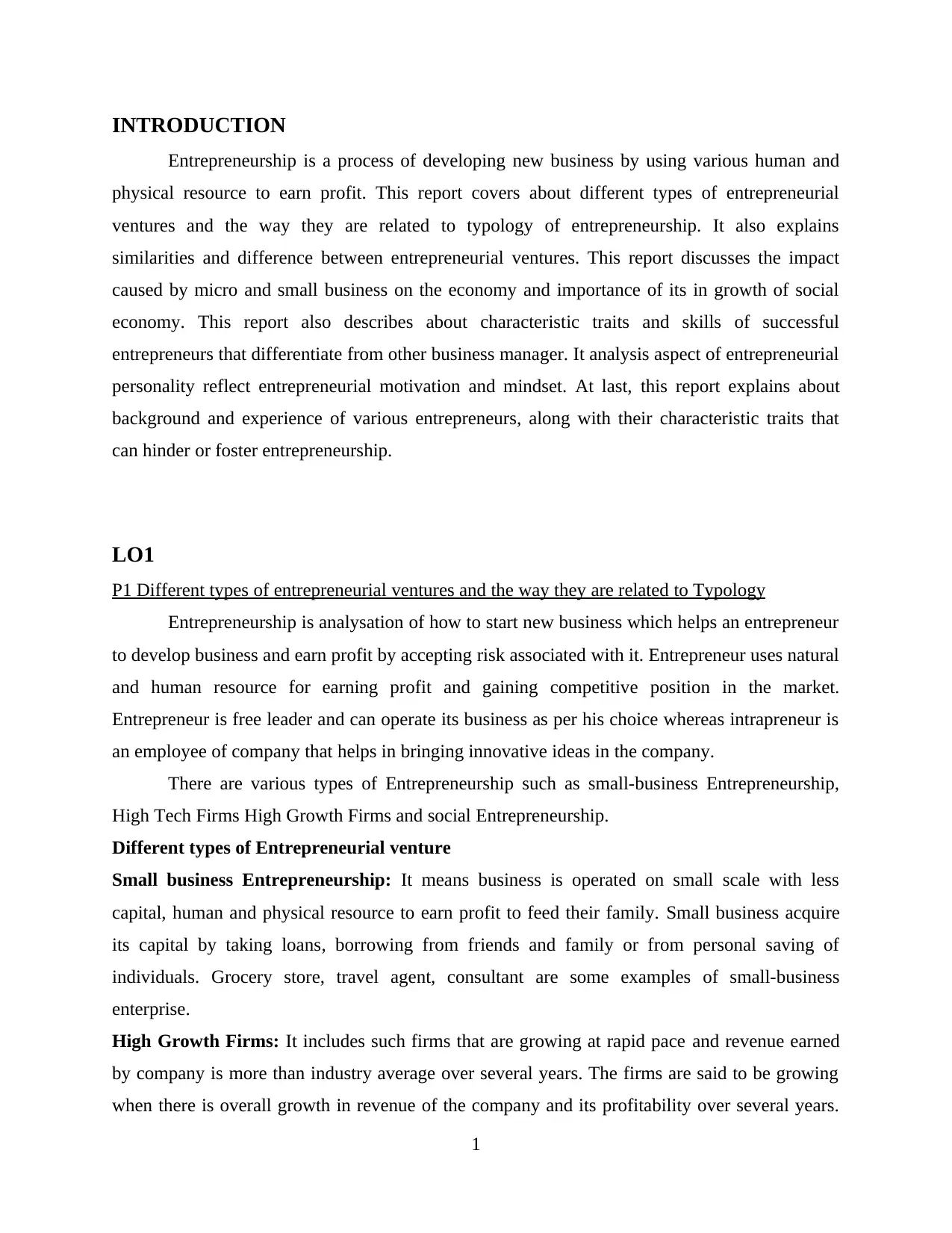
INTRODUCTION
Entrepreneurship is a process of developing new business by using various human and
physical resource to earn profit. This report covers about different types of entrepreneurial
ventures and the way they are related to typology of entrepreneurship. It also explains
similarities and difference between entrepreneurial ventures. This report discusses the impact
caused by micro and small business on the economy and importance of its in growth of social
economy. This report also describes about characteristic traits and skills of successful
entrepreneurs that differentiate from other business manager. It analysis aspect of entrepreneurial
personality reflect entrepreneurial motivation and mindset. At last, this report explains about
background and experience of various entrepreneurs, along with their characteristic traits that
can hinder or foster entrepreneurship.
LO1
P1 Different types of entrepreneurial ventures and the way they are related to Typology
Entrepreneurship is analysation of how to start new business which helps an entrepreneur
to develop business and earn profit by accepting risk associated with it. Entrepreneur uses natural
and human resource for earning profit and gaining competitive position in the market.
Entrepreneur is free leader and can operate its business as per his choice whereas intrapreneur is
an employee of company that helps in bringing innovative ideas in the company.
There are various types of Entrepreneurship such as small-business Entrepreneurship,
High Tech Firms High Growth Firms and social Entrepreneurship.
Different types of Entrepreneurial venture
Small business Entrepreneurship: It means business is operated on small scale with less
capital, human and physical resource to earn profit to feed their family. Small business acquire
its capital by taking loans, borrowing from friends and family or from personal saving of
individuals. Grocery store, travel agent, consultant are some examples of small-business
enterprise.
High Growth Firms: It includes such firms that are growing at rapid pace and revenue earned
by company is more than industry average over several years. The firms are said to be growing
when there is overall growth in revenue of the company and its profitability over several years.
1
Entrepreneurship is a process of developing new business by using various human and
physical resource to earn profit. This report covers about different types of entrepreneurial
ventures and the way they are related to typology of entrepreneurship. It also explains
similarities and difference between entrepreneurial ventures. This report discusses the impact
caused by micro and small business on the economy and importance of its in growth of social
economy. This report also describes about characteristic traits and skills of successful
entrepreneurs that differentiate from other business manager. It analysis aspect of entrepreneurial
personality reflect entrepreneurial motivation and mindset. At last, this report explains about
background and experience of various entrepreneurs, along with their characteristic traits that
can hinder or foster entrepreneurship.
LO1
P1 Different types of entrepreneurial ventures and the way they are related to Typology
Entrepreneurship is analysation of how to start new business which helps an entrepreneur
to develop business and earn profit by accepting risk associated with it. Entrepreneur uses natural
and human resource for earning profit and gaining competitive position in the market.
Entrepreneur is free leader and can operate its business as per his choice whereas intrapreneur is
an employee of company that helps in bringing innovative ideas in the company.
There are various types of Entrepreneurship such as small-business Entrepreneurship,
High Tech Firms High Growth Firms and social Entrepreneurship.
Different types of Entrepreneurial venture
Small business Entrepreneurship: It means business is operated on small scale with less
capital, human and physical resource to earn profit to feed their family. Small business acquire
its capital by taking loans, borrowing from friends and family or from personal saving of
individuals. Grocery store, travel agent, consultant are some examples of small-business
enterprise.
High Growth Firms: It includes such firms that are growing at rapid pace and revenue earned
by company is more than industry average over several years. The firms are said to be growing
when there is overall growth in revenue of the company and its profitability over several years.
1
⊘ This is a preview!⊘
Do you want full access?
Subscribe today to unlock all pages.

Trusted by 1+ million students worldwide
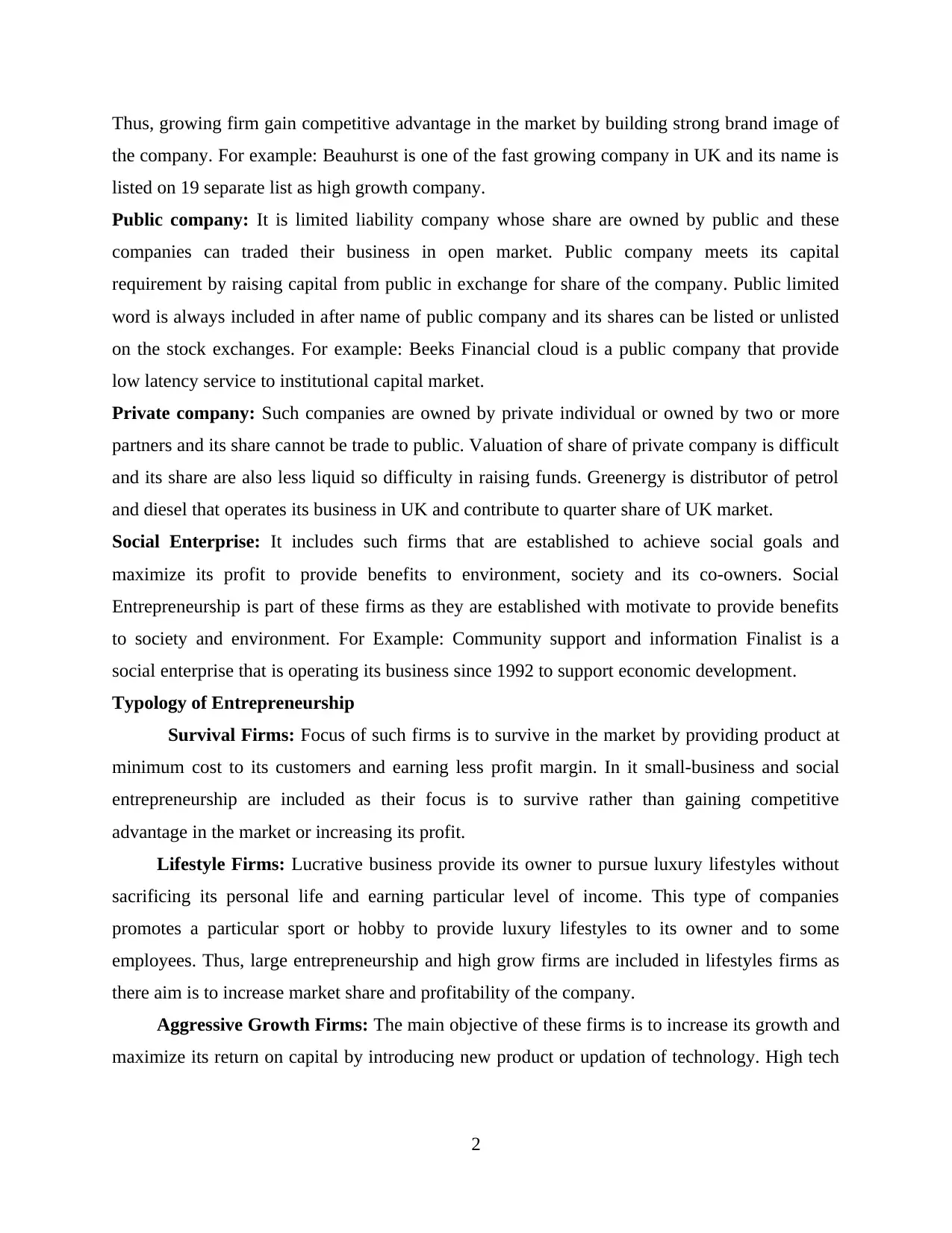
Thus, growing firm gain competitive advantage in the market by building strong brand image of
the company. For example: Beauhurst is one of the fast growing company in UK and its name is
listed on 19 separate list as high growth company.
Public company: It is limited liability company whose share are owned by public and these
companies can traded their business in open market. Public company meets its capital
requirement by raising capital from public in exchange for share of the company. Public limited
word is always included in after name of public company and its shares can be listed or unlisted
on the stock exchanges. For example: Beeks Financial cloud is a public company that provide
low latency service to institutional capital market.
Private company: Such companies are owned by private individual or owned by two or more
partners and its share cannot be trade to public. Valuation of share of private company is difficult
and its share are also less liquid so difficulty in raising funds. Greenergy is distributor of petrol
and diesel that operates its business in UK and contribute to quarter share of UK market.
Social Enterprise: It includes such firms that are established to achieve social goals and
maximize its profit to provide benefits to environment, society and its co-owners. Social
Entrepreneurship is part of these firms as they are established with motivate to provide benefits
to society and environment. For Example: Community support and information Finalist is a
social enterprise that is operating its business since 1992 to support economic development.
Typology of Entrepreneurship
Survival Firms: Focus of such firms is to survive in the market by providing product at
minimum cost to its customers and earning less profit margin. In it small-business and social
entrepreneurship are included as their focus is to survive rather than gaining competitive
advantage in the market or increasing its profit.
Lifestyle Firms: Lucrative business provide its owner to pursue luxury lifestyles without
sacrificing its personal life and earning particular level of income. This type of companies
promotes a particular sport or hobby to provide luxury lifestyles to its owner and to some
employees. Thus, large entrepreneurship and high grow firms are included in lifestyles firms as
there aim is to increase market share and profitability of the company.
Aggressive Growth Firms: The main objective of these firms is to increase its growth and
maximize its return on capital by introducing new product or updation of technology. High tech
2
the company. For example: Beauhurst is one of the fast growing company in UK and its name is
listed on 19 separate list as high growth company.
Public company: It is limited liability company whose share are owned by public and these
companies can traded their business in open market. Public company meets its capital
requirement by raising capital from public in exchange for share of the company. Public limited
word is always included in after name of public company and its shares can be listed or unlisted
on the stock exchanges. For example: Beeks Financial cloud is a public company that provide
low latency service to institutional capital market.
Private company: Such companies are owned by private individual or owned by two or more
partners and its share cannot be trade to public. Valuation of share of private company is difficult
and its share are also less liquid so difficulty in raising funds. Greenergy is distributor of petrol
and diesel that operates its business in UK and contribute to quarter share of UK market.
Social Enterprise: It includes such firms that are established to achieve social goals and
maximize its profit to provide benefits to environment, society and its co-owners. Social
Entrepreneurship is part of these firms as they are established with motivate to provide benefits
to society and environment. For Example: Community support and information Finalist is a
social enterprise that is operating its business since 1992 to support economic development.
Typology of Entrepreneurship
Survival Firms: Focus of such firms is to survive in the market by providing product at
minimum cost to its customers and earning less profit margin. In it small-business and social
entrepreneurship are included as their focus is to survive rather than gaining competitive
advantage in the market or increasing its profit.
Lifestyle Firms: Lucrative business provide its owner to pursue luxury lifestyles without
sacrificing its personal life and earning particular level of income. This type of companies
promotes a particular sport or hobby to provide luxury lifestyles to its owner and to some
employees. Thus, large entrepreneurship and high grow firms are included in lifestyles firms as
there aim is to increase market share and profitability of the company.
Aggressive Growth Firms: The main objective of these firms is to increase its growth and
maximize its return on capital by introducing new product or updation of technology. High tech
2
Paraphrase This Document
Need a fresh take? Get an instant paraphrase of this document with our AI Paraphraser
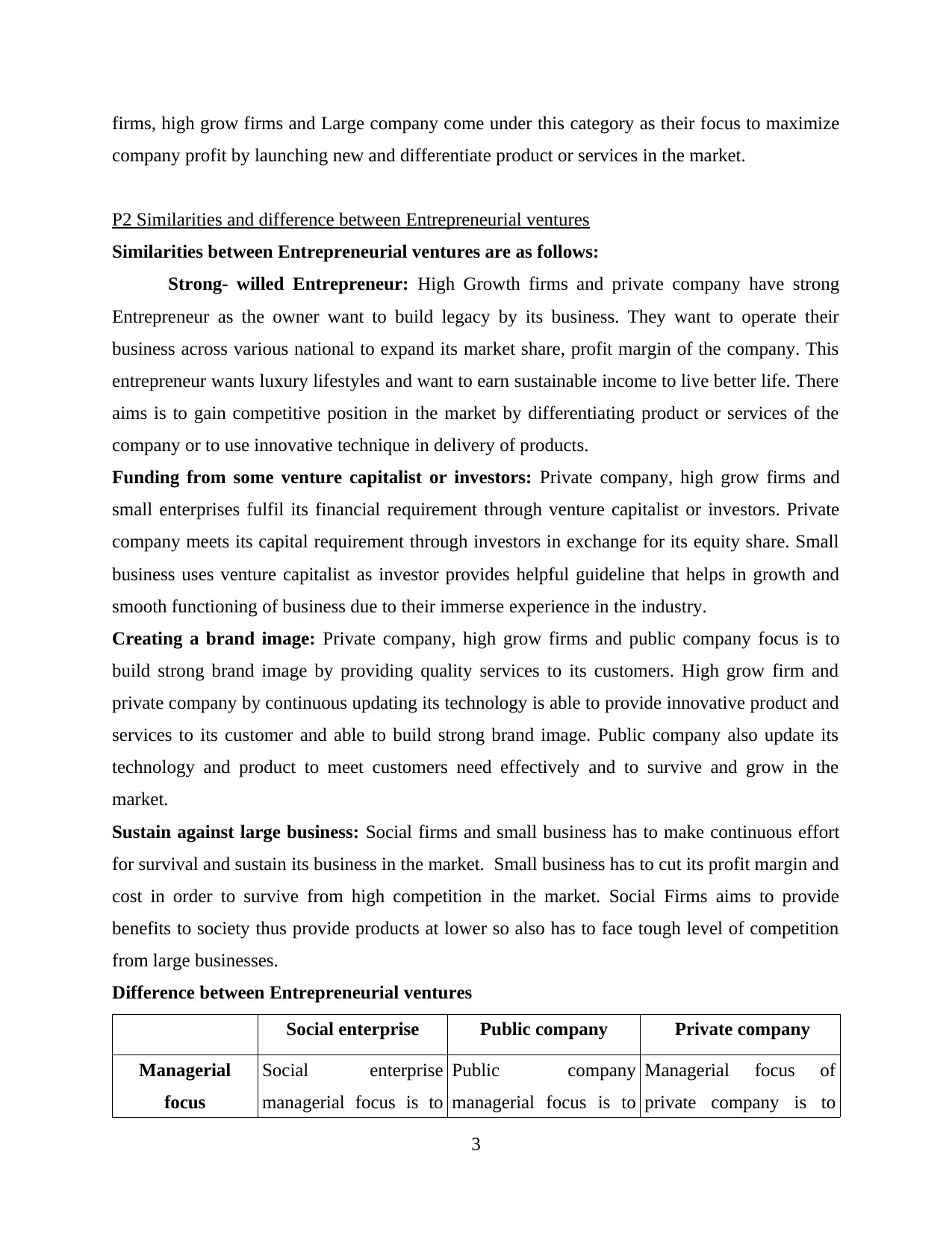
firms, high grow firms and Large company come under this category as their focus to maximize
company profit by launching new and differentiate product or services in the market.
P2 Similarities and difference between Entrepreneurial ventures
Similarities between Entrepreneurial ventures are as follows:
Strong- willed Entrepreneur: High Growth firms and private company have strong
Entrepreneur as the owner want to build legacy by its business. They want to operate their
business across various national to expand its market share, profit margin of the company. This
entrepreneur wants luxury lifestyles and want to earn sustainable income to live better life. There
aims is to gain competitive position in the market by differentiating product or services of the
company or to use innovative technique in delivery of products.
Funding from some venture capitalist or investors: Private company, high grow firms and
small enterprises fulfil its financial requirement through venture capitalist or investors. Private
company meets its capital requirement through investors in exchange for its equity share. Small
business uses venture capitalist as investor provides helpful guideline that helps in growth and
smooth functioning of business due to their immerse experience in the industry.
Creating a brand image: Private company, high grow firms and public company focus is to
build strong brand image by providing quality services to its customers. High grow firm and
private company by continuous updating its technology is able to provide innovative product and
services to its customer and able to build strong brand image. Public company also update its
technology and product to meet customers need effectively and to survive and grow in the
market.
Sustain against large business: Social firms and small business has to make continuous effort
for survival and sustain its business in the market. Small business has to cut its profit margin and
cost in order to survive from high competition in the market. Social Firms aims to provide
benefits to society thus provide products at lower so also has to face tough level of competition
from large businesses.
Difference between Entrepreneurial ventures
Social enterprise Public company Private company
Managerial
focus
Social enterprise
managerial focus is to
Public company
managerial focus is to
Managerial focus of
private company is to
3
company profit by launching new and differentiate product or services in the market.
P2 Similarities and difference between Entrepreneurial ventures
Similarities between Entrepreneurial ventures are as follows:
Strong- willed Entrepreneur: High Growth firms and private company have strong
Entrepreneur as the owner want to build legacy by its business. They want to operate their
business across various national to expand its market share, profit margin of the company. This
entrepreneur wants luxury lifestyles and want to earn sustainable income to live better life. There
aims is to gain competitive position in the market by differentiating product or services of the
company or to use innovative technique in delivery of products.
Funding from some venture capitalist or investors: Private company, high grow firms and
small enterprises fulfil its financial requirement through venture capitalist or investors. Private
company meets its capital requirement through investors in exchange for its equity share. Small
business uses venture capitalist as investor provides helpful guideline that helps in growth and
smooth functioning of business due to their immerse experience in the industry.
Creating a brand image: Private company, high grow firms and public company focus is to
build strong brand image by providing quality services to its customers. High grow firm and
private company by continuous updating its technology is able to provide innovative product and
services to its customer and able to build strong brand image. Public company also update its
technology and product to meet customers need effectively and to survive and grow in the
market.
Sustain against large business: Social firms and small business has to make continuous effort
for survival and sustain its business in the market. Small business has to cut its profit margin and
cost in order to survive from high competition in the market. Social Firms aims to provide
benefits to society thus provide products at lower so also has to face tough level of competition
from large businesses.
Difference between Entrepreneurial ventures
Social enterprise Public company Private company
Managerial
focus
Social enterprise
managerial focus is to
Public company
managerial focus is to
Managerial focus of
private company is to
3
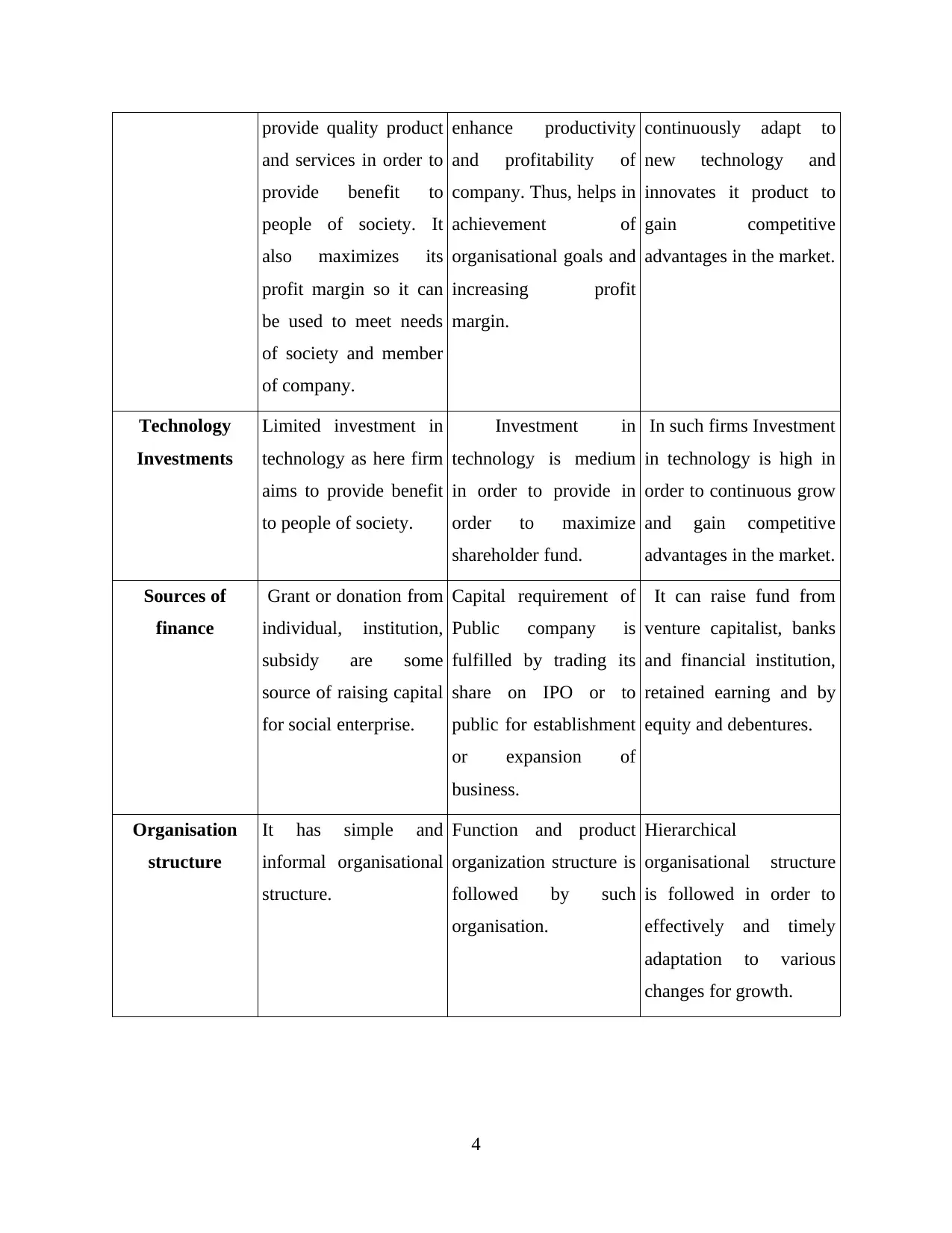
provide quality product
and services in order to
provide benefit to
people of society. It
also maximizes its
profit margin so it can
be used to meet needs
of society and member
of company.
enhance productivity
and profitability of
company. Thus, helps in
achievement of
organisational goals and
increasing profit
margin.
continuously adapt to
new technology and
innovates it product to
gain competitive
advantages in the market.
Technology
Investments
Limited investment in
technology as here firm
aims to provide benefit
to people of society.
Investment in
technology is medium
in order to provide in
order to maximize
shareholder fund.
In such firms Investment
in technology is high in
order to continuous grow
and gain competitive
advantages in the market.
Sources of
finance
Grant or donation from
individual, institution,
subsidy are some
source of raising capital
for social enterprise.
Capital requirement of
Public company is
fulfilled by trading its
share on IPO or to
public for establishment
or expansion of
business.
It can raise fund from
venture capitalist, banks
and financial institution,
retained earning and by
equity and debentures.
Organisation
structure
It has simple and
informal organisational
structure.
Function and product
organization structure is
followed by such
organisation.
Hierarchical
organisational structure
is followed in order to
effectively and timely
adaptation to various
changes for growth.
4
and services in order to
provide benefit to
people of society. It
also maximizes its
profit margin so it can
be used to meet needs
of society and member
of company.
enhance productivity
and profitability of
company. Thus, helps in
achievement of
organisational goals and
increasing profit
margin.
continuously adapt to
new technology and
innovates it product to
gain competitive
advantages in the market.
Technology
Investments
Limited investment in
technology as here firm
aims to provide benefit
to people of society.
Investment in
technology is medium
in order to provide in
order to maximize
shareholder fund.
In such firms Investment
in technology is high in
order to continuous grow
and gain competitive
advantages in the market.
Sources of
finance
Grant or donation from
individual, institution,
subsidy are some
source of raising capital
for social enterprise.
Capital requirement of
Public company is
fulfilled by trading its
share on IPO or to
public for establishment
or expansion of
business.
It can raise fund from
venture capitalist, banks
and financial institution,
retained earning and by
equity and debentures.
Organisation
structure
It has simple and
informal organisational
structure.
Function and product
organization structure is
followed by such
organisation.
Hierarchical
organisational structure
is followed in order to
effectively and timely
adaptation to various
changes for growth.
4
⊘ This is a preview!⊘
Do you want full access?
Subscribe today to unlock all pages.

Trusted by 1+ million students worldwide
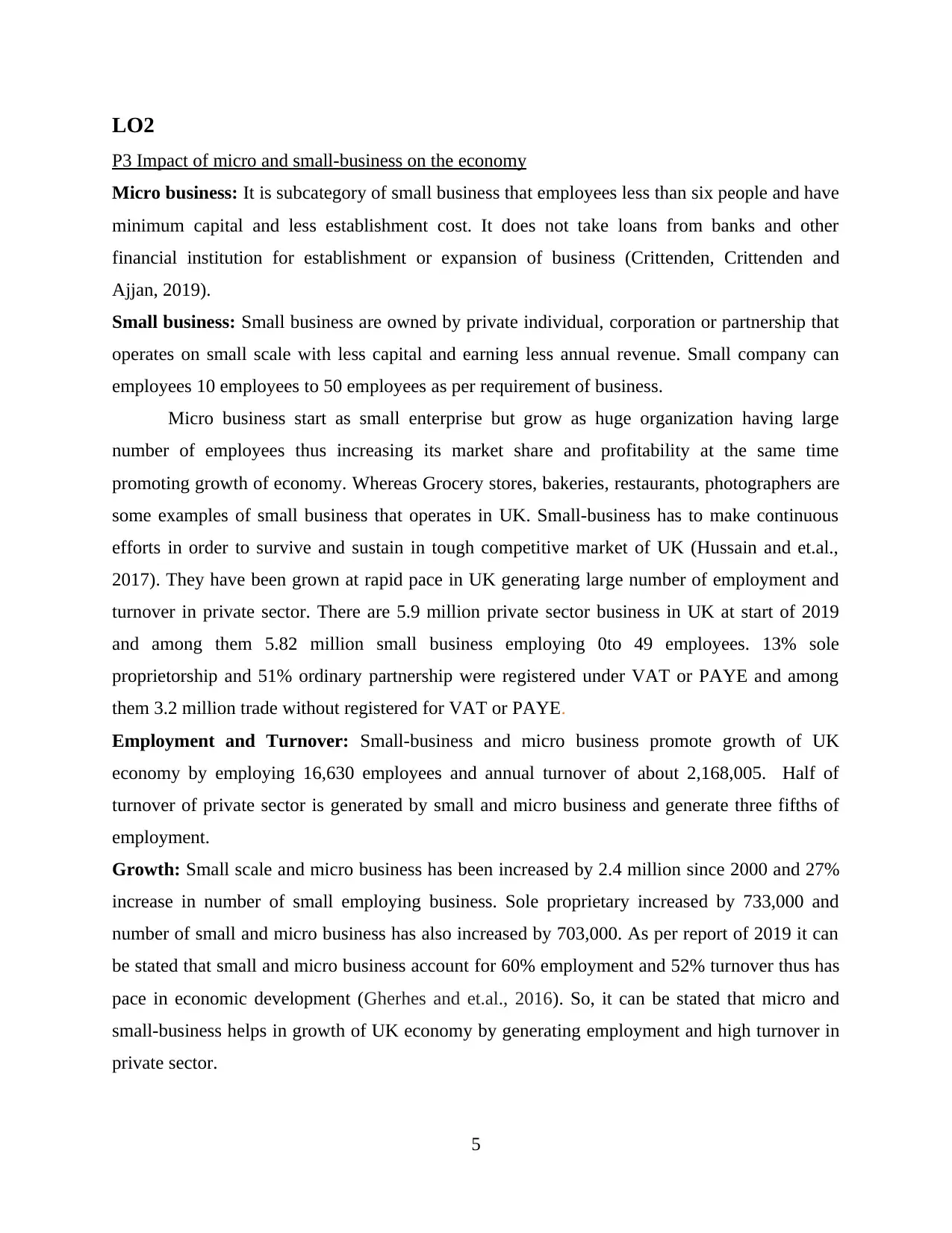
LO2
P3 Impact of micro and small-business on the economy
Micro business: It is subcategory of small business that employees less than six people and have
minimum capital and less establishment cost. It does not take loans from banks and other
financial institution for establishment or expansion of business (Crittenden, Crittenden and
Ajjan, 2019).
Small business: Small business are owned by private individual, corporation or partnership that
operates on small scale with less capital and earning less annual revenue. Small company can
employees 10 employees to 50 employees as per requirement of business.
Micro business start as small enterprise but grow as huge organization having large
number of employees thus increasing its market share and profitability at the same time
promoting growth of economy. Whereas Grocery stores, bakeries, restaurants, photographers are
some examples of small business that operates in UK. Small-business has to make continuous
efforts in order to survive and sustain in tough competitive market of UK (Hussain and et.al.,
2017). They have been grown at rapid pace in UK generating large number of employment and
turnover in private sector. There are 5.9 million private sector business in UK at start of 2019
and among them 5.82 million small business employing 0to 49 employees. 13% sole
proprietorship and 51% ordinary partnership were registered under VAT or PAYE and among
them 3.2 million trade without registered for VAT or PAYE.
Employment and Turnover: Small-business and micro business promote growth of UK
economy by employing 16,630 employees and annual turnover of about 2,168,005. Half of
turnover of private sector is generated by small and micro business and generate three fifths of
employment.
Growth: Small scale and micro business has been increased by 2.4 million since 2000 and 27%
increase in number of small employing business. Sole proprietary increased by 733,000 and
number of small and micro business has also increased by 703,000. As per report of 2019 it can
be stated that small and micro business account for 60% employment and 52% turnover thus has
pace in economic development (Gherhes and et.al., 2016). So, it can be stated that micro and
small-business helps in growth of UK economy by generating employment and high turnover in
private sector.
5
P3 Impact of micro and small-business on the economy
Micro business: It is subcategory of small business that employees less than six people and have
minimum capital and less establishment cost. It does not take loans from banks and other
financial institution for establishment or expansion of business (Crittenden, Crittenden and
Ajjan, 2019).
Small business: Small business are owned by private individual, corporation or partnership that
operates on small scale with less capital and earning less annual revenue. Small company can
employees 10 employees to 50 employees as per requirement of business.
Micro business start as small enterprise but grow as huge organization having large
number of employees thus increasing its market share and profitability at the same time
promoting growth of economy. Whereas Grocery stores, bakeries, restaurants, photographers are
some examples of small business that operates in UK. Small-business has to make continuous
efforts in order to survive and sustain in tough competitive market of UK (Hussain and et.al.,
2017). They have been grown at rapid pace in UK generating large number of employment and
turnover in private sector. There are 5.9 million private sector business in UK at start of 2019
and among them 5.82 million small business employing 0to 49 employees. 13% sole
proprietorship and 51% ordinary partnership were registered under VAT or PAYE and among
them 3.2 million trade without registered for VAT or PAYE.
Employment and Turnover: Small-business and micro business promote growth of UK
economy by employing 16,630 employees and annual turnover of about 2,168,005. Half of
turnover of private sector is generated by small and micro business and generate three fifths of
employment.
Growth: Small scale and micro business has been increased by 2.4 million since 2000 and 27%
increase in number of small employing business. Sole proprietary increased by 733,000 and
number of small and micro business has also increased by 703,000. As per report of 2019 it can
be stated that small and micro business account for 60% employment and 52% turnover thus has
pace in economic development (Gherhes and et.al., 2016). So, it can be stated that micro and
small-business helps in growth of UK economy by generating employment and high turnover in
private sector.
5
Paraphrase This Document
Need a fresh take? Get an instant paraphrase of this document with our AI Paraphraser
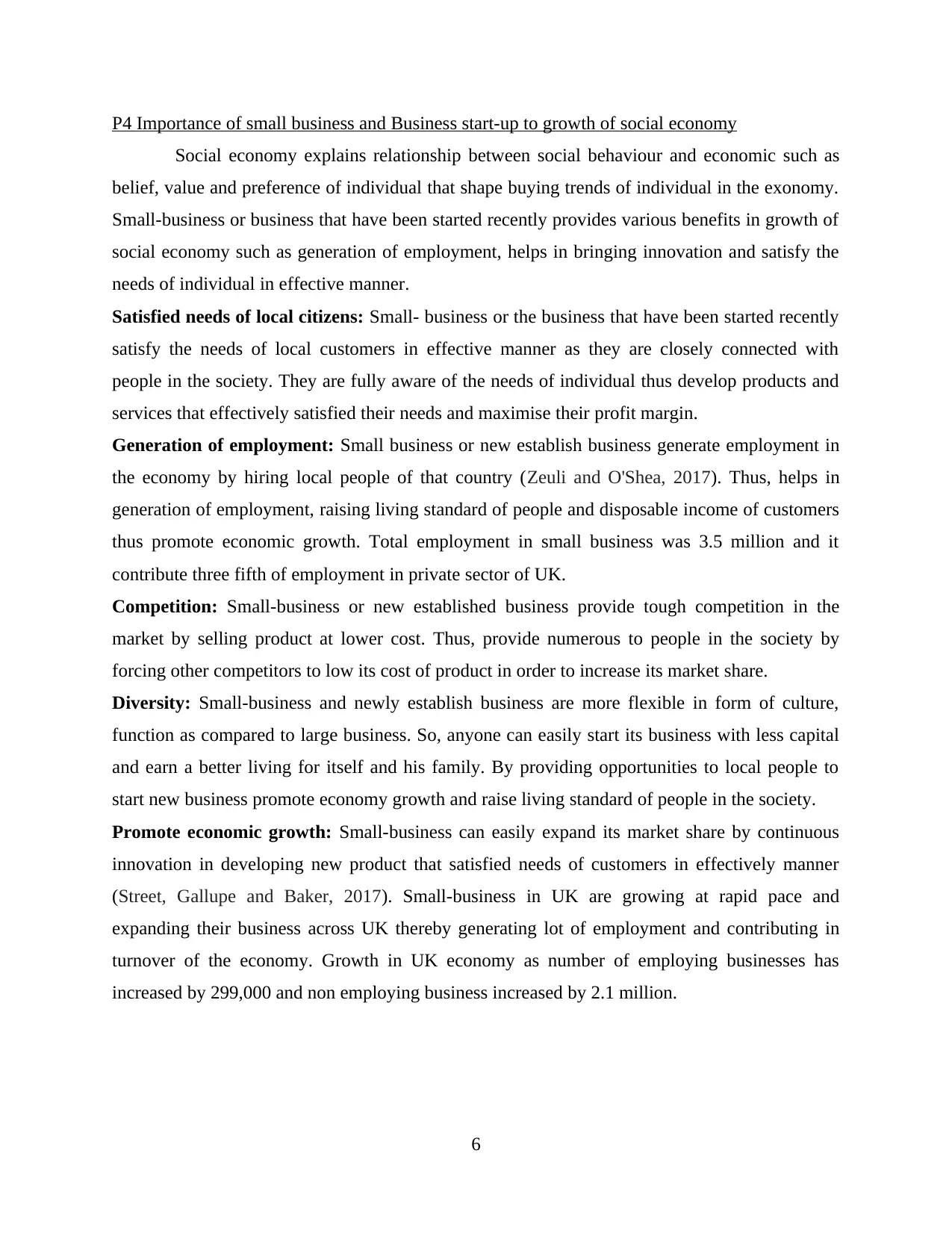
P4 Importance of small business and Business start-up to growth of social economy
Social economy explains relationship between social behaviour and economic such as
belief, value and preference of individual that shape buying trends of individual in the exonomy.
Small-business or business that have been started recently provides various benefits in growth of
social economy such as generation of employment, helps in bringing innovation and satisfy the
needs of individual in effective manner.
Satisfied needs of local citizens: Small- business or the business that have been started recently
satisfy the needs of local customers in effective manner as they are closely connected with
people in the society. They are fully aware of the needs of individual thus develop products and
services that effectively satisfied their needs and maximise their profit margin.
Generation of employment: Small business or new establish business generate employment in
the economy by hiring local people of that country (Zeuli and O'Shea, 2017). Thus, helps in
generation of employment, raising living standard of people and disposable income of customers
thus promote economic growth. Total employment in small business was 3.5 million and it
contribute three fifth of employment in private sector of UK.
Competition: Small-business or new established business provide tough competition in the
market by selling product at lower cost. Thus, provide numerous to people in the society by
forcing other competitors to low its cost of product in order to increase its market share.
Diversity: Small-business and newly establish business are more flexible in form of culture,
function as compared to large business. So, anyone can easily start its business with less capital
and earn a better living for itself and his family. By providing opportunities to local people to
start new business promote economy growth and raise living standard of people in the society.
Promote economic growth: Small-business can easily expand its market share by continuous
innovation in developing new product that satisfied needs of customers in effectively manner
(Street, Gallupe and Baker, 2017). Small-business in UK are growing at rapid pace and
expanding their business across UK thereby generating lot of employment and contributing in
turnover of the economy. Growth in UK economy as number of employing businesses has
increased by 299,000 and non employing business increased by 2.1 million.
6
Social economy explains relationship between social behaviour and economic such as
belief, value and preference of individual that shape buying trends of individual in the exonomy.
Small-business or business that have been started recently provides various benefits in growth of
social economy such as generation of employment, helps in bringing innovation and satisfy the
needs of individual in effective manner.
Satisfied needs of local citizens: Small- business or the business that have been started recently
satisfy the needs of local customers in effective manner as they are closely connected with
people in the society. They are fully aware of the needs of individual thus develop products and
services that effectively satisfied their needs and maximise their profit margin.
Generation of employment: Small business or new establish business generate employment in
the economy by hiring local people of that country (Zeuli and O'Shea, 2017). Thus, helps in
generation of employment, raising living standard of people and disposable income of customers
thus promote economic growth. Total employment in small business was 3.5 million and it
contribute three fifth of employment in private sector of UK.
Competition: Small-business or new established business provide tough competition in the
market by selling product at lower cost. Thus, provide numerous to people in the society by
forcing other competitors to low its cost of product in order to increase its market share.
Diversity: Small-business and newly establish business are more flexible in form of culture,
function as compared to large business. So, anyone can easily start its business with less capital
and earn a better living for itself and his family. By providing opportunities to local people to
start new business promote economy growth and raise living standard of people in the society.
Promote economic growth: Small-business can easily expand its market share by continuous
innovation in developing new product that satisfied needs of customers in effectively manner
(Street, Gallupe and Baker, 2017). Small-business in UK are growing at rapid pace and
expanding their business across UK thereby generating lot of employment and contributing in
turnover of the economy. Growth in UK economy as number of employing businesses has
increased by 299,000 and non employing business increased by 2.1 million.
6
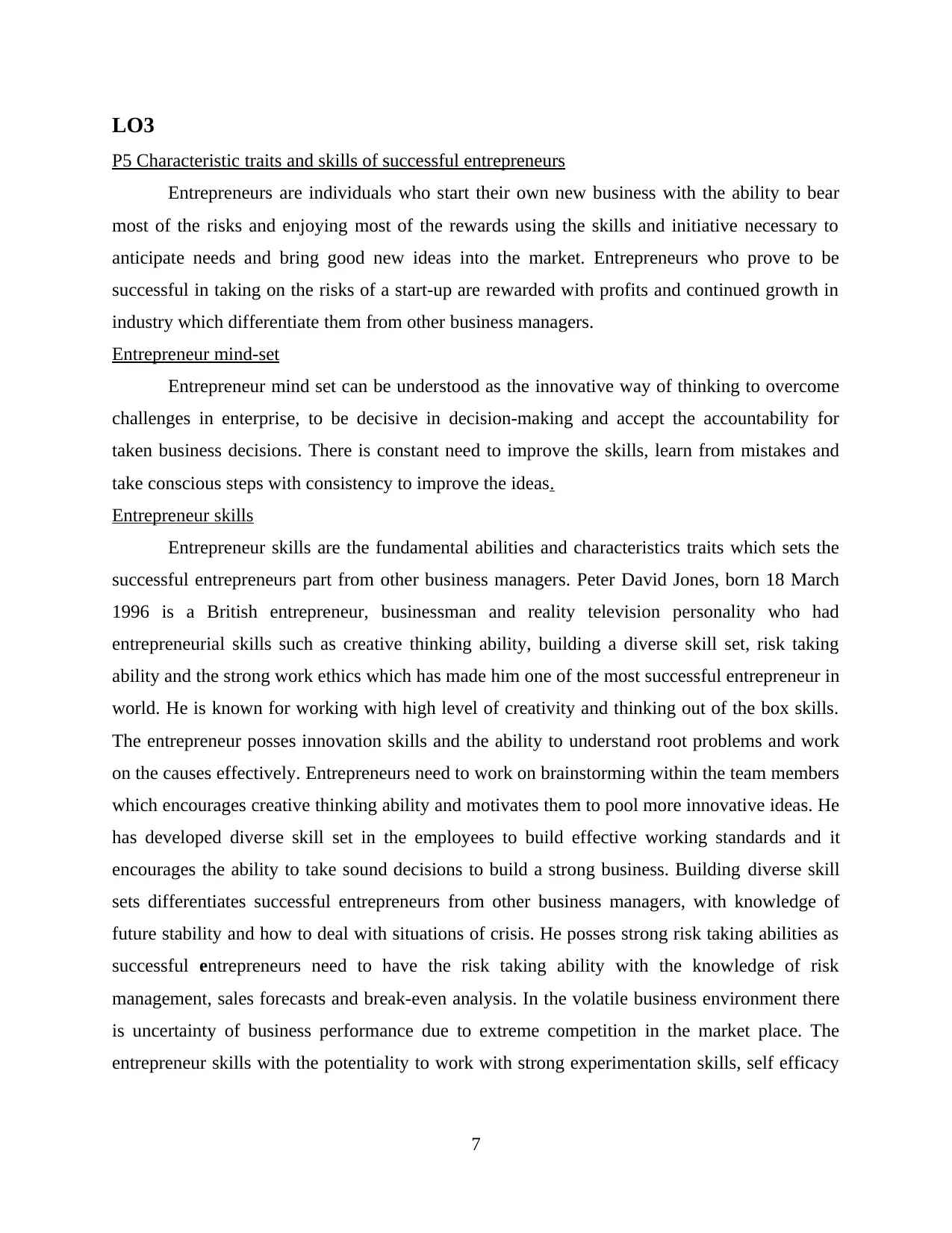
LO3
P5 Characteristic traits and skills of successful entrepreneurs
Entrepreneurs are individuals who start their own new business with the ability to bear
most of the risks and enjoying most of the rewards using the skills and initiative necessary to
anticipate needs and bring good new ideas into the market. Entrepreneurs who prove to be
successful in taking on the risks of a start-up are rewarded with profits and continued growth in
industry which differentiate them from other business managers.
Entrepreneur mind-set
Entrepreneur mind set can be understood as the innovative way of thinking to overcome
challenges in enterprise, to be decisive in decision-making and accept the accountability for
taken business decisions. There is constant need to improve the skills, learn from mistakes and
take conscious steps with consistency to improve the ideas.
Entrepreneur skills
Entrepreneur skills are the fundamental abilities and characteristics traits which sets the
successful entrepreneurs part from other business managers. Peter David Jones, born 18 March
1996 is a British entrepreneur, businessman and reality television personality who had
entrepreneurial skills such as creative thinking ability, building a diverse skill set, risk taking
ability and the strong work ethics which has made him one of the most successful entrepreneur in
world. He is known for working with high level of creativity and thinking out of the box skills.
The entrepreneur posses innovation skills and the ability to understand root problems and work
on the causes effectively. Entrepreneurs need to work on brainstorming within the team members
which encourages creative thinking ability and motivates them to pool more innovative ideas. He
has developed diverse skill set in the employees to build effective working standards and it
encourages the ability to take sound decisions to build a strong business. Building diverse skill
sets differentiates successful entrepreneurs from other business managers, with knowledge of
future stability and how to deal with situations of crisis. He posses strong risk taking abilities as
successful entrepreneurs need to have the risk taking ability with the knowledge of risk
management, sales forecasts and break-even analysis. In the volatile business environment there
is uncertainty of business performance due to extreme competition in the market place. The
entrepreneur skills with the potentiality to work with strong experimentation skills, self efficacy
7
P5 Characteristic traits and skills of successful entrepreneurs
Entrepreneurs are individuals who start their own new business with the ability to bear
most of the risks and enjoying most of the rewards using the skills and initiative necessary to
anticipate needs and bring good new ideas into the market. Entrepreneurs who prove to be
successful in taking on the risks of a start-up are rewarded with profits and continued growth in
industry which differentiate them from other business managers.
Entrepreneur mind-set
Entrepreneur mind set can be understood as the innovative way of thinking to overcome
challenges in enterprise, to be decisive in decision-making and accept the accountability for
taken business decisions. There is constant need to improve the skills, learn from mistakes and
take conscious steps with consistency to improve the ideas.
Entrepreneur skills
Entrepreneur skills are the fundamental abilities and characteristics traits which sets the
successful entrepreneurs part from other business managers. Peter David Jones, born 18 March
1996 is a British entrepreneur, businessman and reality television personality who had
entrepreneurial skills such as creative thinking ability, building a diverse skill set, risk taking
ability and the strong work ethics which has made him one of the most successful entrepreneur in
world. He is known for working with high level of creativity and thinking out of the box skills.
The entrepreneur posses innovation skills and the ability to understand root problems and work
on the causes effectively. Entrepreneurs need to work on brainstorming within the team members
which encourages creative thinking ability and motivates them to pool more innovative ideas. He
has developed diverse skill set in the employees to build effective working standards and it
encourages the ability to take sound decisions to build a strong business. Building diverse skill
sets differentiates successful entrepreneurs from other business managers, with knowledge of
future stability and how to deal with situations of crisis. He posses strong risk taking abilities as
successful entrepreneurs need to have the risk taking ability with the knowledge of risk
management, sales forecasts and break-even analysis. In the volatile business environment there
is uncertainty of business performance due to extreme competition in the market place. The
entrepreneur skills with the potentiality to work with strong experimentation skills, self efficacy
7
⊘ This is a preview!⊘
Do you want full access?
Subscribe today to unlock all pages.

Trusted by 1+ million students worldwide
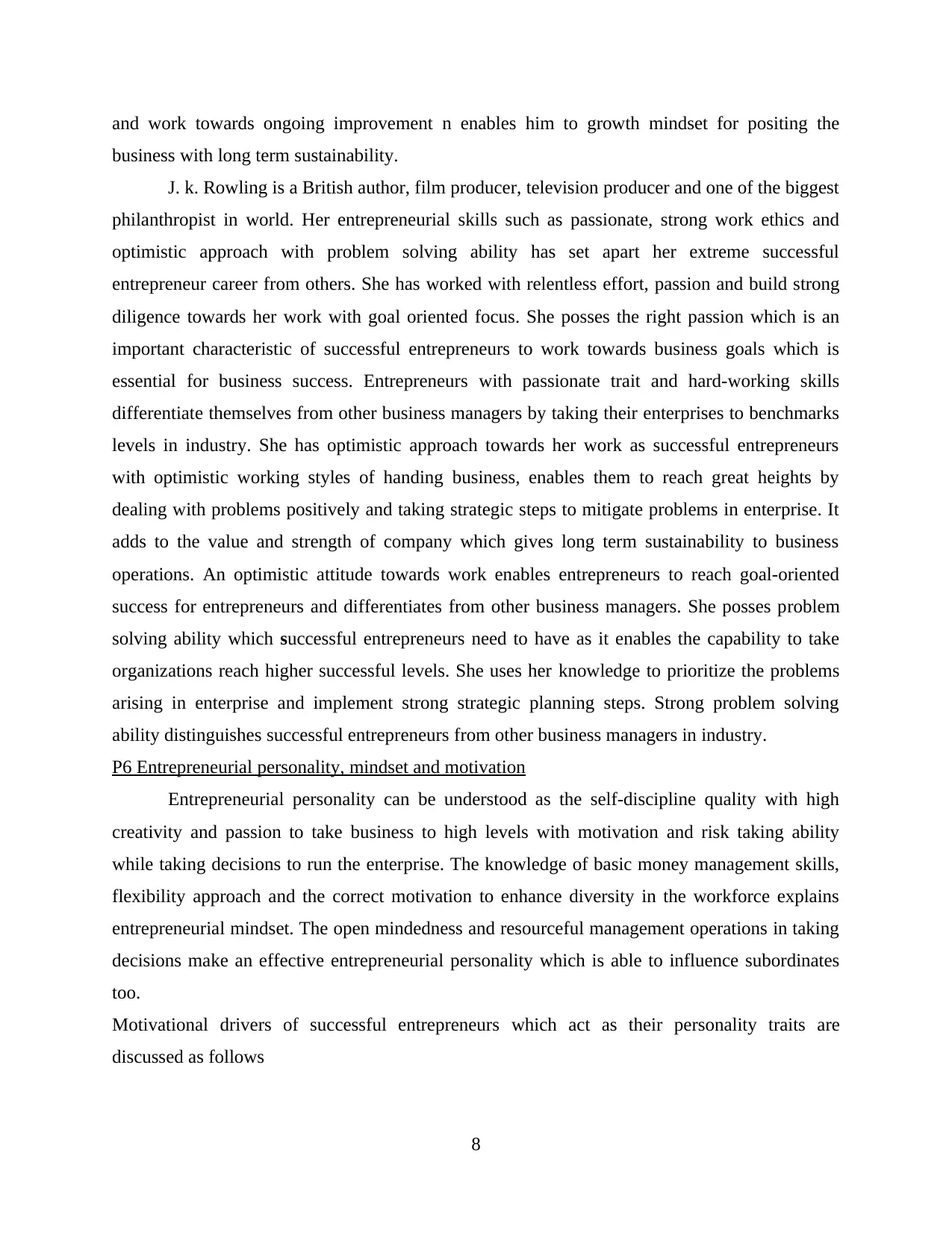
and work towards ongoing improvement n enables him to growth mindset for positing the
business with long term sustainability.
J. k. Rowling is a British author, film producer, television producer and one of the biggest
philanthropist in world. Her entrepreneurial skills such as passionate, strong work ethics and
optimistic approach with problem solving ability has set apart her extreme successful
entrepreneur career from others. She has worked with relentless effort, passion and build strong
diligence towards her work with goal oriented focus. She posses the right passion which is an
important characteristic of successful entrepreneurs to work towards business goals which is
essential for business success. Entrepreneurs with passionate trait and hard-working skills
differentiate themselves from other business managers by taking their enterprises to benchmarks
levels in industry. She has optimistic approach towards her work as successful entrepreneurs
with optimistic working styles of handing business, enables them to reach great heights by
dealing with problems positively and taking strategic steps to mitigate problems in enterprise. It
adds to the value and strength of company which gives long term sustainability to business
operations. An optimistic attitude towards work enables entrepreneurs to reach goal-oriented
success for entrepreneurs and differentiates from other business managers. She posses problem
solving ability which successful entrepreneurs need to have as it enables the capability to take
organizations reach higher successful levels. She uses her knowledge to prioritize the problems
arising in enterprise and implement strong strategic planning steps. Strong problem solving
ability distinguishes successful entrepreneurs from other business managers in industry.
P6 Entrepreneurial personality, mindset and motivation
Entrepreneurial personality can be understood as the self-discipline quality with high
creativity and passion to take business to high levels with motivation and risk taking ability
while taking decisions to run the enterprise. The knowledge of basic money management skills,
flexibility approach and the correct motivation to enhance diversity in the workforce explains
entrepreneurial mindset. The open mindedness and resourceful management operations in taking
decisions make an effective entrepreneurial personality which is able to influence subordinates
too.
Motivational drivers of successful entrepreneurs which act as their personality traits are
discussed as follows
8
business with long term sustainability.
J. k. Rowling is a British author, film producer, television producer and one of the biggest
philanthropist in world. Her entrepreneurial skills such as passionate, strong work ethics and
optimistic approach with problem solving ability has set apart her extreme successful
entrepreneur career from others. She has worked with relentless effort, passion and build strong
diligence towards her work with goal oriented focus. She posses the right passion which is an
important characteristic of successful entrepreneurs to work towards business goals which is
essential for business success. Entrepreneurs with passionate trait and hard-working skills
differentiate themselves from other business managers by taking their enterprises to benchmarks
levels in industry. She has optimistic approach towards her work as successful entrepreneurs
with optimistic working styles of handing business, enables them to reach great heights by
dealing with problems positively and taking strategic steps to mitigate problems in enterprise. It
adds to the value and strength of company which gives long term sustainability to business
operations. An optimistic attitude towards work enables entrepreneurs to reach goal-oriented
success for entrepreneurs and differentiates from other business managers. She posses problem
solving ability which successful entrepreneurs need to have as it enables the capability to take
organizations reach higher successful levels. She uses her knowledge to prioritize the problems
arising in enterprise and implement strong strategic planning steps. Strong problem solving
ability distinguishes successful entrepreneurs from other business managers in industry.
P6 Entrepreneurial personality, mindset and motivation
Entrepreneurial personality can be understood as the self-discipline quality with high
creativity and passion to take business to high levels with motivation and risk taking ability
while taking decisions to run the enterprise. The knowledge of basic money management skills,
flexibility approach and the correct motivation to enhance diversity in the workforce explains
entrepreneurial mindset. The open mindedness and resourceful management operations in taking
decisions make an effective entrepreneurial personality which is able to influence subordinates
too.
Motivational drivers of successful entrepreneurs which act as their personality traits are
discussed as follows
8
Paraphrase This Document
Need a fresh take? Get an instant paraphrase of this document with our AI Paraphraser
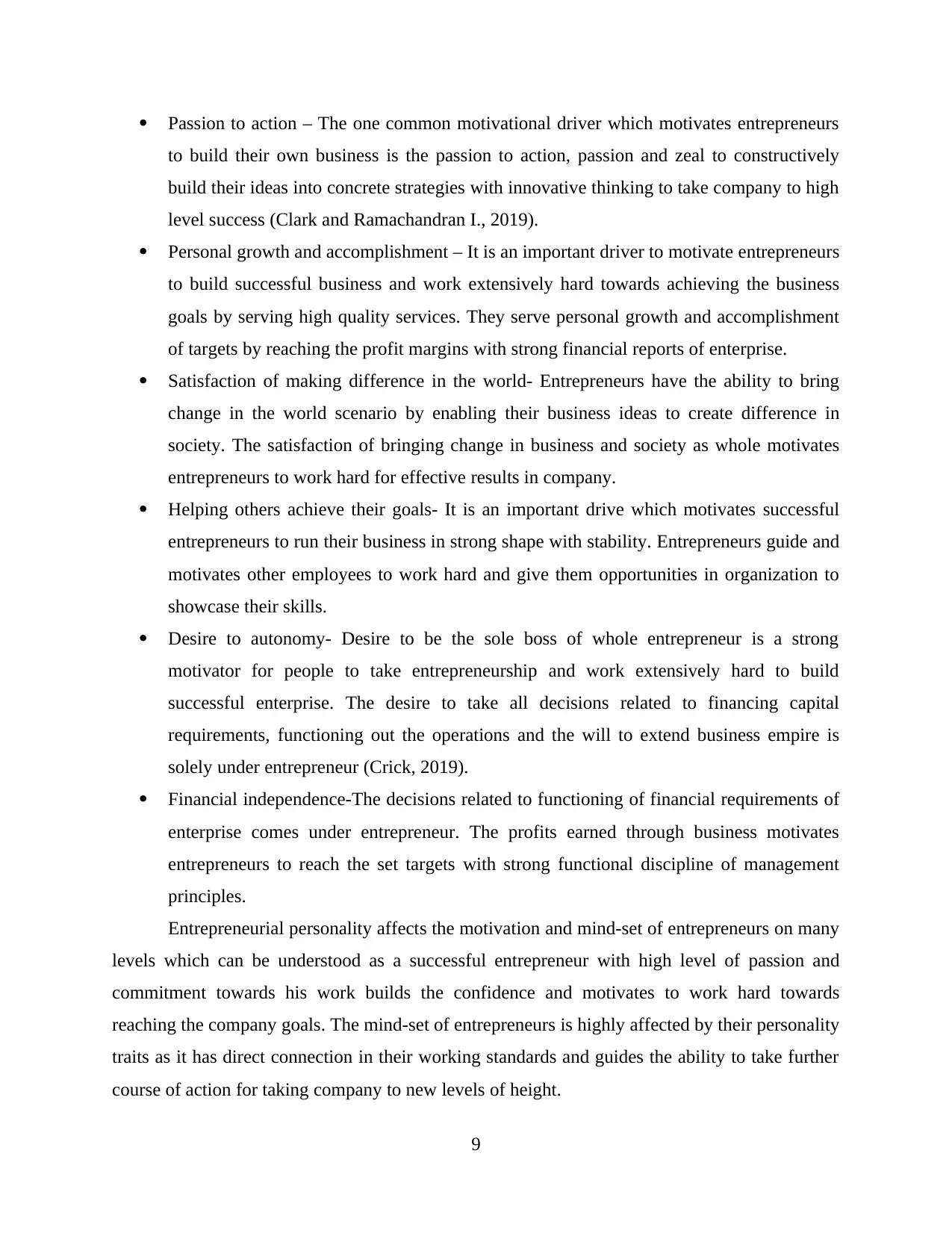
Passion to action – The one common motivational driver which motivates entrepreneurs
to build their own business is the passion to action, passion and zeal to constructively
build their ideas into concrete strategies with innovative thinking to take company to high
level success (Clark and Ramachandran I., 2019).
Personal growth and accomplishment – It is an important driver to motivate entrepreneurs
to build successful business and work extensively hard towards achieving the business
goals by serving high quality services. They serve personal growth and accomplishment
of targets by reaching the profit margins with strong financial reports of enterprise.
Satisfaction of making difference in the world- Entrepreneurs have the ability to bring
change in the world scenario by enabling their business ideas to create difference in
society. The satisfaction of bringing change in business and society as whole motivates
entrepreneurs to work hard for effective results in company.
Helping others achieve their goals- It is an important drive which motivates successful
entrepreneurs to run their business in strong shape with stability. Entrepreneurs guide and
motivates other employees to work hard and give them opportunities in organization to
showcase their skills.
Desire to autonomy- Desire to be the sole boss of whole entrepreneur is a strong
motivator for people to take entrepreneurship and work extensively hard to build
successful enterprise. The desire to take all decisions related to financing capital
requirements, functioning out the operations and the will to extend business empire is
solely under entrepreneur (Crick, 2019).
Financial independence-The decisions related to functioning of financial requirements of
enterprise comes under entrepreneur. The profits earned through business motivates
entrepreneurs to reach the set targets with strong functional discipline of management
principles.
Entrepreneurial personality affects the motivation and mind-set of entrepreneurs on many
levels which can be understood as a successful entrepreneur with high level of passion and
commitment towards his work builds the confidence and motivates to work hard towards
reaching the company goals. The mind-set of entrepreneurs is highly affected by their personality
traits as it has direct connection in their working standards and guides the ability to take further
course of action for taking company to new levels of height.
9
to build their own business is the passion to action, passion and zeal to constructively
build their ideas into concrete strategies with innovative thinking to take company to high
level success (Clark and Ramachandran I., 2019).
Personal growth and accomplishment – It is an important driver to motivate entrepreneurs
to build successful business and work extensively hard towards achieving the business
goals by serving high quality services. They serve personal growth and accomplishment
of targets by reaching the profit margins with strong financial reports of enterprise.
Satisfaction of making difference in the world- Entrepreneurs have the ability to bring
change in the world scenario by enabling their business ideas to create difference in
society. The satisfaction of bringing change in business and society as whole motivates
entrepreneurs to work hard for effective results in company.
Helping others achieve their goals- It is an important drive which motivates successful
entrepreneurs to run their business in strong shape with stability. Entrepreneurs guide and
motivates other employees to work hard and give them opportunities in organization to
showcase their skills.
Desire to autonomy- Desire to be the sole boss of whole entrepreneur is a strong
motivator for people to take entrepreneurship and work extensively hard to build
successful enterprise. The desire to take all decisions related to financing capital
requirements, functioning out the operations and the will to extend business empire is
solely under entrepreneur (Crick, 2019).
Financial independence-The decisions related to functioning of financial requirements of
enterprise comes under entrepreneur. The profits earned through business motivates
entrepreneurs to reach the set targets with strong functional discipline of management
principles.
Entrepreneurial personality affects the motivation and mind-set of entrepreneurs on many
levels which can be understood as a successful entrepreneur with high level of passion and
commitment towards his work builds the confidence and motivates to work hard towards
reaching the company goals. The mind-set of entrepreneurs is highly affected by their personality
traits as it has direct connection in their working standards and guides the ability to take further
course of action for taking company to new levels of height.
9
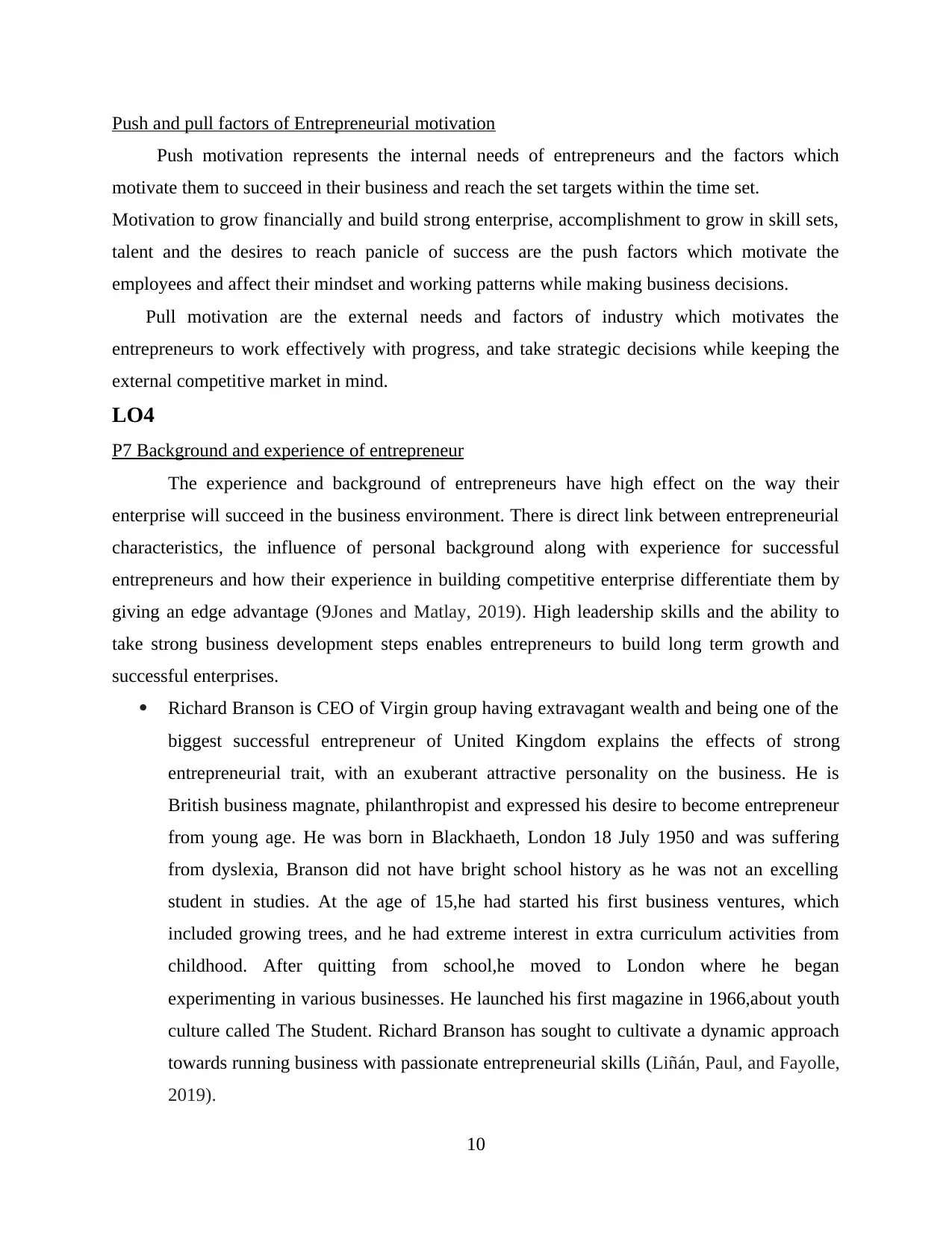
Push and pull factors of Entrepreneurial motivation
Push motivation represents the internal needs of entrepreneurs and the factors which
motivate them to succeed in their business and reach the set targets within the time set.
Motivation to grow financially and build strong enterprise, accomplishment to grow in skill sets,
talent and the desires to reach panicle of success are the push factors which motivate the
employees and affect their mindset and working patterns while making business decisions.
Pull motivation are the external needs and factors of industry which motivates the
entrepreneurs to work effectively with progress, and take strategic decisions while keeping the
external competitive market in mind.
LO4
P7 Background and experience of entrepreneur
The experience and background of entrepreneurs have high effect on the way their
enterprise will succeed in the business environment. There is direct link between entrepreneurial
characteristics, the influence of personal background along with experience for successful
entrepreneurs and how their experience in building competitive enterprise differentiate them by
giving an edge advantage (9Jones and Matlay, 2019). High leadership skills and the ability to
take strong business development steps enables entrepreneurs to build long term growth and
successful enterprises.
Richard Branson is CEO of Virgin group having extravagant wealth and being one of the
biggest successful entrepreneur of United Kingdom explains the effects of strong
entrepreneurial trait, with an exuberant attractive personality on the business. He is
British business magnate, philanthropist and expressed his desire to become entrepreneur
from young age. He was born in Blackhaeth, London 18 July 1950 and was suffering
from dyslexia, Branson did not have bright school history as he was not an excelling
student in studies. At the age of 15,he had started his first business ventures, which
included growing trees, and he had extreme interest in extra curriculum activities from
childhood. After quitting from school,he moved to London where he began
experimenting in various businesses. He launched his first magazine in 1966,about youth
culture called The Student. Richard Branson has sought to cultivate a dynamic approach
towards running business with passionate entrepreneurial skills (Liñán, Paul, and Fayolle,
2019).
10
Push motivation represents the internal needs of entrepreneurs and the factors which
motivate them to succeed in their business and reach the set targets within the time set.
Motivation to grow financially and build strong enterprise, accomplishment to grow in skill sets,
talent and the desires to reach panicle of success are the push factors which motivate the
employees and affect their mindset and working patterns while making business decisions.
Pull motivation are the external needs and factors of industry which motivates the
entrepreneurs to work effectively with progress, and take strategic decisions while keeping the
external competitive market in mind.
LO4
P7 Background and experience of entrepreneur
The experience and background of entrepreneurs have high effect on the way their
enterprise will succeed in the business environment. There is direct link between entrepreneurial
characteristics, the influence of personal background along with experience for successful
entrepreneurs and how their experience in building competitive enterprise differentiate them by
giving an edge advantage (9Jones and Matlay, 2019). High leadership skills and the ability to
take strong business development steps enables entrepreneurs to build long term growth and
successful enterprises.
Richard Branson is CEO of Virgin group having extravagant wealth and being one of the
biggest successful entrepreneur of United Kingdom explains the effects of strong
entrepreneurial trait, with an exuberant attractive personality on the business. He is
British business magnate, philanthropist and expressed his desire to become entrepreneur
from young age. He was born in Blackhaeth, London 18 July 1950 and was suffering
from dyslexia, Branson did not have bright school history as he was not an excelling
student in studies. At the age of 15,he had started his first business ventures, which
included growing trees, and he had extreme interest in extra curriculum activities from
childhood. After quitting from school,he moved to London where he began
experimenting in various businesses. He launched his first magazine in 1966,about youth
culture called The Student. Richard Branson has sought to cultivate a dynamic approach
towards running business with passionate entrepreneurial skills (Liñán, Paul, and Fayolle,
2019).
10
⊘ This is a preview!⊘
Do you want full access?
Subscribe today to unlock all pages.

Trusted by 1+ million students worldwide
1 out of 17
Related Documents
Your All-in-One AI-Powered Toolkit for Academic Success.
+13062052269
info@desklib.com
Available 24*7 on WhatsApp / Email
![[object Object]](/_next/static/media/star-bottom.7253800d.svg)
Unlock your academic potential
Copyright © 2020–2026 A2Z Services. All Rights Reserved. Developed and managed by ZUCOL.




